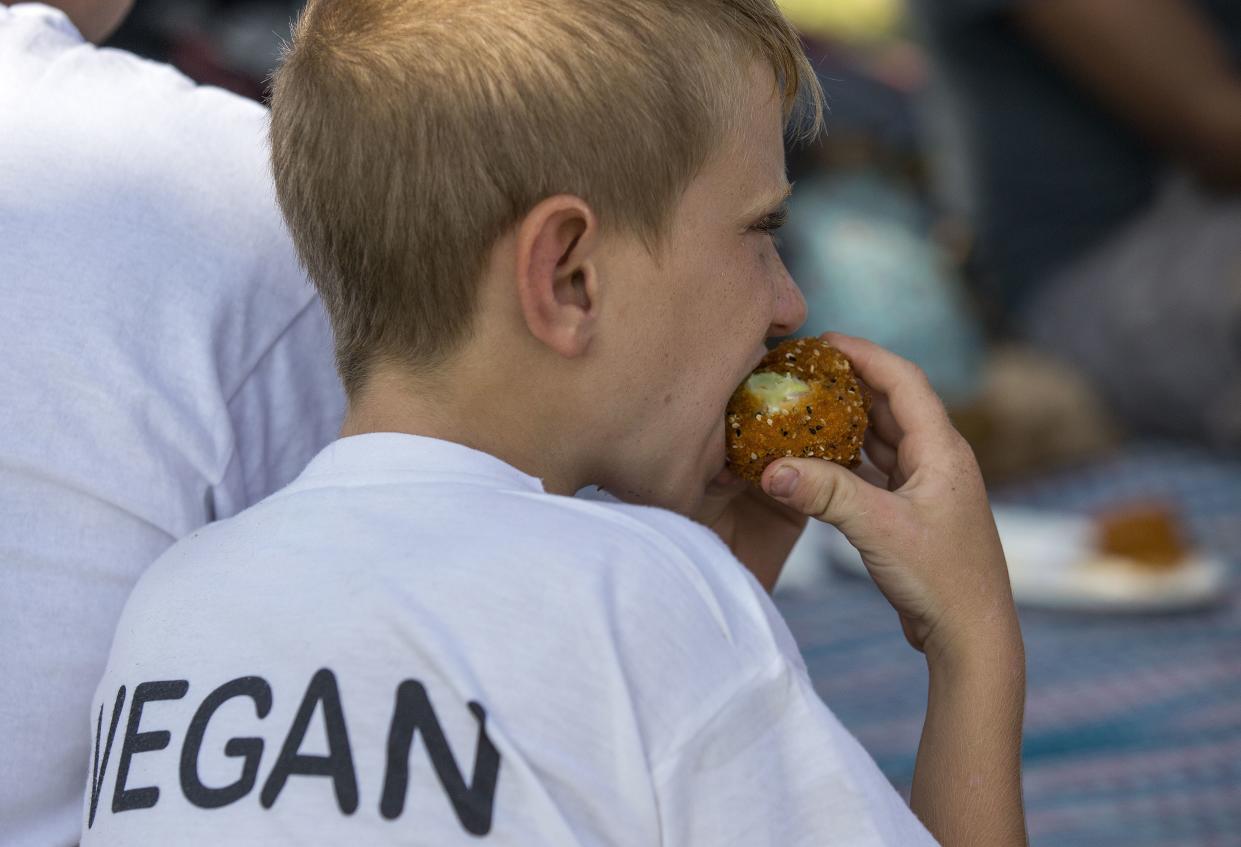What to do when your kid decides to be a vegan

It’s most parents’ wish that our children will eat healthy — that our picky toddlers will expand their palates beyond string cheese and apple sauce, and our teenagers will not subsist entirely on pizza. But what if some savvy kids take their nutritional concerns beyond even what their parents are prepared to provide? One mother on the British forum Mumsnet asked the community for advice when her 10-year-old daughter declared herself a vegan.
“So my 10yr old DD [dear daughter] has announced that she does not believe it is Ok to use animal products any more and from now on will not be eating/wearing/using anything made from animals or produced by animals,” wrote funnyfairy360 this week. “Now don’t get me wrong I’m all for her finding her own way in life but this is not just becoming vegetarian or going goth, becoming vegan is life changing and to be honest too inconvenient and expensive for me to make happen for her right now.”
It’s certainly one thing to raise a vegan family, with responsible adults planning out their meals appropriate for their needs — but we can see how it’s difficult for a mother to fit in an entirely separate meal plan for one kid while the rest of the family is chowing down on meat and dairy. Many participants on the forum have posted answers for her, ranging from making the kid buy her own vegan food to finding some ways to compromise. If this mother or any other parent decides to let their newly principled child get her way, then they might need a little more advice than that.
“A vegan diet is traditionally a healthier diet,” Ashanti Woods, MD, a pediatrician at Mercy Family Care Physicians in Baltimore, tells Yahoo Lifestyle. “A child would likely have lower risk for high blood pressure, high cholesterol, diabetes, and cancer. A vegan diet also exposes a child to the natural remedies offered by many plant-based foods.”
It’s also great to see children play a role in their health, Woods adds. At the same time, he says, some vegans run the risk of missing out on essential nutrients. A healthy vegan diet involves much more than just eliminating foods.
Animal products are easy sources of things like protein, vitamin B12, calcium, vitamin D, amino acids, iron, and omega 3 fatty acids. At the same time, the Academy of Nutrition and Dietetics has determined that “well-designed vegetarian diets that may include fortified foods or supplements [can] meet current nutrient recommendations and are appropriate for all stages of the life cycle, including pregnancy, lactation, infancy, childhood, and adolescence. Vegetarians must use special care to ensure adequate intake of vitamin B-12.”
While many of the helpful participants on Mumsnet recommended supplements, registered dietitian Dana White says that’s not the ideal way to feed a growing vegan kid.
“Supplements can’t just be a replacement for the food you’re not eating, because you need calories,” White tells Yahoo.
The good news is that because so many people are changing to plant-based diets, grocery shelves are packed with foods that are fortified with these nutrients.
“Calcium and vitamin D are becoming easier [to obtain] because most dairy alternatives are fortified with them,” White says. Typical breakfast cereals like Cheerios are fortified with B12 and iron.
Another favorite source of B12 for vegans is nutritional yeast. “It’s one of the only naturally existing plant-based sources of B12,” says White, who has used it as a condiment and to make vegan cheese. “You can’t just have it one day a month. It has to be a regular fixture in your diet.”
Of course, one of the first nutrients people may be concerned about missing is protein, especially since growing kids need even more of it than adults. Legumes are good sources of protein, but only soybeans and quinoa contain all nine essential amino acids the way meat does.
“You can also combine foods to get those essential amino acids,” White says. “Rice and beans is an example. Or a peanut butter sandwich — any combination of grain and legume.”
Once children are on a vegan diet, parents should take note if they appear to lose a large amount of weight. It’s also recommended to mention their dietary restrictions to their pediatrician. White says it may be good to monitor them for deficiencies in vitamin D or iron, because those symptoms don’t show up until the problem is serious (such as brittle bones).
According to Woods, however, vegan kids don’t have to undergo specific testing, “unless the child develops symptoms of fatigue, poor growth, numbness or tingling of extremities, diarrhea, or recurring rashes.”
Parents don’t have to do all the homework of planning healthy vegan meals by themselves, especially if it’s the kid’s idea in the first place. White suggests that they work with their children to learn about food, where it comes from, and why we need certain nutrients. Some websites to look at together for tips and recipes include SuperKids Nutrition, EatRight, ChooseMyPlate.gov, and Pulses.
“It can be really good when you have a child thinking about their food and where it comes from in any capacity,” White says.
In other words, funnyfairy360 and her daughter have some homework to do this summer!
Read more from Yahoo Lifestyle:
This woman used the ketogenic diet to lose 94 pounds in just one year
The U.S. government cares more about the baby formula industry than it does about babies
Learning how to manage ‘cyberchondria’ — the constant urge to Google your health
Follow us on Instagram, Facebook, and Twitter for nonstop inspiration delivered fresh to your feed, every day.
